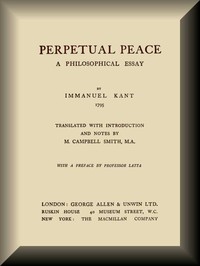Perpetual Peace: A Philosophical Essay by Immanuel Kant
"Perpetual Peace: A Philosophical Essay" by Immanuel Kant is a philosophical treatise written in the late 18th century. The essay presents Kant's arguments for achieving lasting international peace, addressing the complexities and contradictions inherent in human relations and the state of nations. The primary focus is on the moral principles and political structures that could foster a stable environment free of war among states. The opening of the work introduces the context
of the essay and discusses the importance of Kant's ideas against the backdrop of the ongoing interest in peace movements during his time. It highlights the historical evolution of thoughts surrounding war and peace, as well as the various philosophical influences on Kant, including the desire for a federation of nations that prioritizes mutual cooperation and moral governance. Kant argues that achieving perpetual peace requires facing the harsh realities of political life while aspiring towards moral ideals, suggesting that true peace can only be realized through a collective legal framework among states and the establishment of republican governments. (This is an automatically generated summary.)
Read or download for free
| How to read | Url | Size | |||
|---|---|---|---|---|---|
| Read now! | https://www.gutenberg.org/ebooks/50922.html.images | 431 kB | |||
| EPUB3 (E-readers incl. Send-to-Kindle) | https://www.gutenberg.org/ebooks/50922.epub3.images | 204 kB | |||
| EPUB (older E-readers) | https://www.gutenberg.org/ebooks/50922.epub.images | 208 kB | |||
| EPUB (no images, older E-readers) | https://www.gutenberg.org/ebooks/50922.epub.noimages | 192 kB | |||
| Kindle | https://www.gutenberg.org/ebooks/50922.kf8.images | 329 kB | |||
| older Kindles | https://www.gutenberg.org/ebooks/50922.kindle.images | 291 kB | |||
| Plain Text UTF-8 | https://www.gutenberg.org/ebooks/50922.txt.utf-8 | 342 kB | |||
| Download HTML (zip) | https://www.gutenberg.org/cache/epub/50922/pg50922-h.zip | 181 kB | |||
| There may be more files related to this item. | |||||
Similar Books
About this eBook
| Author | Kant, Immanuel, 1724-1804 |
|---|---|
| Translator | Smith, Mary Campbell |
| LoC No. | 38005918 |
| Uniform Title | Zum ewigen Frieden. English |
| Title | Perpetual Peace: A Philosophical Essay |
| Note | Reading ease score: 55.0 (10th to 12th grade). Somewhat difficult to read. |
| Note | Wikipedia page about this book: https://en.wikipedia.org/wiki/Perpetual_Peace:_A_Philosophical_Sketch |
| Credits |
Produced by Turgut Dincer, Ramon Pajares Box and the Online Distributed Proofreading Team at http://www.pgdp.net (This file was produced from images generously made available by The Internet Archive) |
| Language | English |
| LoC Class | JX: Political science: International law |
| Subject | Peace |
| Category | Text |
| EBook-No. | 50922 |
| Release Date | Jan 14, 2016 |
| Copyright Status | Public domain in the USA. |
| Downloads | 4758 downloads in the last 30 days. |
| Project Gutenberg eBooks are always free! | |

